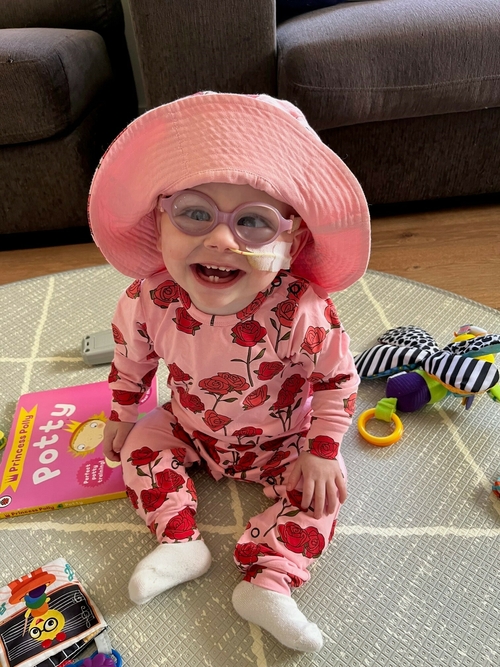Preterm Health
Helping the smallest humans survive some of the biggest challenges
Why is it a problem?
Why is it a problem?
What is preterm birth?
The World Health Organization (WHO) defines preterm babies as those born alive before 37 weeks of pregnancy are completed. But there are sub-categories of preterm birth, based on gestational age:
• extremely preterm (less than 28 weeks)
• very preterm (28 weeks to less than 32 weeks)
• moderate to late preterm (32 weeks to less than 37 weeks).
At Cure Kids, although there is a natural overlap with areas of health research, our preterm researchers are often focused on extremely preterm babies, i.e. those between 23 and 27 weeks gestation (i.e. less than 28 weeks)
Why does preterm birth happen?
Preterm birth occurs for a variety of reasons. While most preterm births ‘just happen’ (spontaneously) some are due to early induction of labour or a caesarean birth (which could be for medical or non-medical reasons).
Common causes of preterm birth include multiple pregnancies, infections and chronic conditions such as diabetes and high blood pressure; however, often no cause is identified. There can also be various genetic or social factors that lead to preterm birth. A better understanding of these causes and mechanisms will help health researchers to offer new solutions to help prevent preterm birth.
Did you know?
Fetal growth between 23 and 27 weeks is more rapid than at any other stage of human growth. This is the same period when extremely low birth-weight babies are born, i.e. below 1,000g — and that’s less than the weight of two blocks of butter!
What are we doing to help?
Here are just some of the research projects we are funding to help improve preterm health in New Zealand.
RECENTLY FUNDED...
Seeking a new treatment to prevent lung disease in extremely preterm babies
Associate Professor Chris McKinlay, University of Auckland
There are around 500 babies born extremely premature in New Zealand every year and over 50% of these babies will develop bronchopulmonary dysplasia (BPD) — a lung disease that increases the risk of many other medical serious conditions. But researchers led by Dr Chis McKinlay from Auckland University are working on a new treatment to help premature babies — and their families — breathe a little easier. Along with neonatal specialists from around New Zealand and Australia, Dr McKinlay has been investigating a new way of giving anti-inflammatory steroids (corticosteroids) to babies to help prevent the development of BPD.
Investigating a new treatment for preterm babies with brain injury
Dr Simerdeep Dhillon, University of Auckland
Every year, about 8% of babies born in New Zealand arrive prematurely. And some of these children will have a significant risk of lifelong challenges due to brain injury and impaired development.
To really make a difference, paediatricians need treatments that can be given following birth, even after a very long delay. Dr Simerdeep Dhillon is leading a study to see if a commonly used drug (Exenatide), given days after a period of low oxygen, can help reduce inflammation and repair the preterm brain.
If successful, this research could pave the way for future studies that might reduce disabilities and improve outcomes for preterm infants.
PREVIOUS RESEARCH...
Measuring the effect on babies (at age 2) treated with dextrose gel at birth.
Professor Jane Harding, University of Auckland
Hypoglycaemia (low blood sugar) is the only readily preventable cause of brain damage in newborn babies. While up to 15% of newborn babies have low blood sugar, this number is higher when the mother has diabetes (50%) or the baby is born preterm (60%). Professor Jane Harding is a neonatologist specialising in the care of newborn babies. Her team (recent winners of the Prime Minister’s Science Prize) have conducted a world-first trial which showed that dextrose gel massaged into the inside of a baby’s cheek can be used to treat hypoglycemia and therefore reduce the need for admission to intensive care for treatment.
Improving the nutritional care of preterm babies
Dr Barbara Cormack and Professor Frank Bloomfield, University of Auckland
Researchers know that extremely preterm births or extremely low birthweights can be considered a nutritional emergency. So adequate protein intake in the weeks after birth is critical for optimum growth and development, but there is little evidence on the amount required. Led by Dr Barbara Cormack and Professor Frank Bloomfield the ProVIDe Study aims to assess whether a higher protein intake in the week after birth will improve neurodevelopment and the amount required.

Paige was born on December 6, 2021, entering the world prematurely at just 23 weeks and 4 days gestation, and weighing a tiny 525 grams. She is the third child of Erin and Clinton, and sister to two older brothers, Blake and Lachlan.
Paige was delivered by an emergency c-section, marking the start of a long and challenging path. She spent the initial 199 days of her life in the Neonatal Intensive Care Unit (NICU), where she fought against various medical challenges.
Despite her resilience, Paige has undergone numerous surgeries and medical interventions as a result of her preterm birth. At just 26 days old, she faced her first emergency surgery when her bowel twisted, causing severe distress. Subsequently, another surgery was performed to remove a section of her intestines that had died. These surgeries left Paige with visible scars on her stomach.
Paige was also diagnosed with Chronic Lung Disease (CLD) at birth, a common condition among premature babies due to underdeveloped lungs. To help improve her lung function, Paige underwent steroid courses. She also battled Retinopathy of Prematurity (ROP), which required multiple eye tests and eventually led to laser eye surgery, and the discovery of cataracts.
Despite all these challenges, Paige remains a strong and determined child. She faces her medical conditions with bravery. Paige's development is carefully monitored, and she continues to receive support from an exceptional team.
Paige's family decided to participate in the PLUSS Trial, led by Dr Chris McKinlay and colleagues from Melbourne, hoping to give their daughter the best chance at a healthy life. The trial's potential benefits to preterm babies and families motivated them to be part of this groundbreaking research.
For Paige's family, research holds significant importance. They recognise that advancements in medicine and NICU practices are made possible through research. The support from Cure Kids, including the contributions on Red Nose Day, enables researchers like Dr. Chris McKinlay to find innovative ways to improve the health of children like Paige.
As for Paige's aspirations, her family considers each day a blessing, given the challenges she has overcome. They hope she continues to embrace life with her determined and cheeky personality. Paige adores her older brothers, and they are her loyal protectors.
Paige's journey has not been easy, but with the love and support of her family and the medical community, she continues to thrive and inspire everyone around her.
4 Active Preterm Health projects
-
Associate Professor M. FraserExosome-based diagnostics: A Better Start For Baby’s BrainAwarded $109,763Preterm Health
-
Assoc Prof J. DeanMitochondrial dysfunction and delayed treatment of preterm brain dysmaturationAwarded $124,534Preterm Health
-
Dr S. DhillonInvestigating a new treatment for preterm babies with brain injuryAwarded $120,538Preterm Health
-
Associate Professor C. McKinlayA new treatment for preventing lung disease in extremely preterm babiesAwarded $109,997Preterm Health

Help fund researchers like Justin.
Every cent helps, no matter how small.
Big Research
We are currently supporting over $16 million of child health research projects.
Learn more-
Preterm Health
4 Active projects$464.8K -
Childhood Cancers
2 Active projects$3.2M -
Maternal and Infant Conditions
8 Active projects$751.4K -
Rheumatic Heart Disease
6 Active projects$2.8M -
Childhood Development and Learning Difficulties
1 Active project$228K -
Neurological and Neurodevelopmental Disorders
3 Active projects$749.2K -
Endocrinology, Metabolism & Nutrition
2 Active projects$125K -
Mental Health and Wellbeing
9 Active projects$1.2M -
Oral and Dental Disease
2 Active projects$151K -
Genetic Conditions and Rare Disorders
3 Active projects$801K -
Respiratory Conditions
5 Active projects$862.6K -
Infectious Disease
2 Active projects$219.7K -
Gastrointestinal Conditions
1 Active project$600K




